
 |
Register or Log In To remove these advertisements. |
|
|
|
|||||||
 |
|
|
Thread Tools | Display Modes |
|
|
#1 |
|
Registered User
Join Date: May 2011
Location: Anderson SC
Posts: 3,902
|
X Member Design and Frame Bracing- '66 C10
I've decided to box the frame on my '66 C10 and while I'm at it I want to add an X member to limit how much the frame is able to twist. I've already started making patterns for the boxing plates but need some help on the X member. I've been looking over a few different frame builders' pics and came across Fatman Fabrication's Tri-Five frame, and really like their X member design.
http://www.fatmanfab.com/55_57chevy.php It's got a full tube center section instead of an open square tube design. Round tube is really strong against torsional twisting so I think that would be a good idea to integrate into my X member.  I'm starting from scratch and have the ability to build it myself. I also have a tubing roller so I can make arches. Would the arched tubing have any strength benefits over straight tubing? And what about round tubing vs square tubing? I'd like for it to be able to accomodate dual 3" exhaust, and keep in mind that a '66 has trailing arms instead of leaf springs. As you can see in the pic below, with only one of the rear bags inflated there's quite a bit of frame flex. I'll be boxing the frame from the C notches up to the steering box, and welding around the rivet heads that hold the crossmembers in place. Any ideas/comments/input would be greatly appreciated! 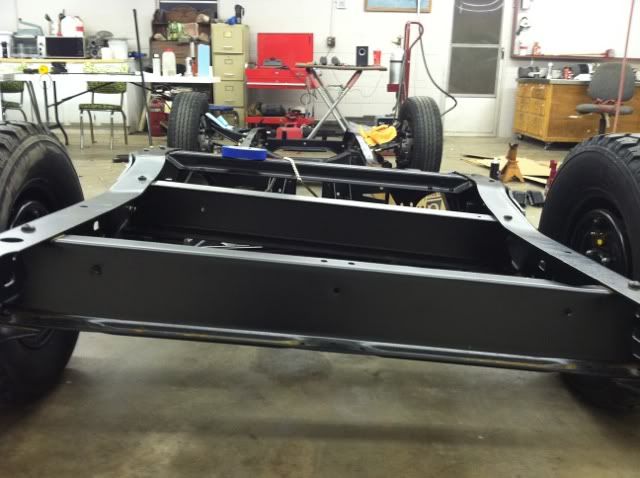 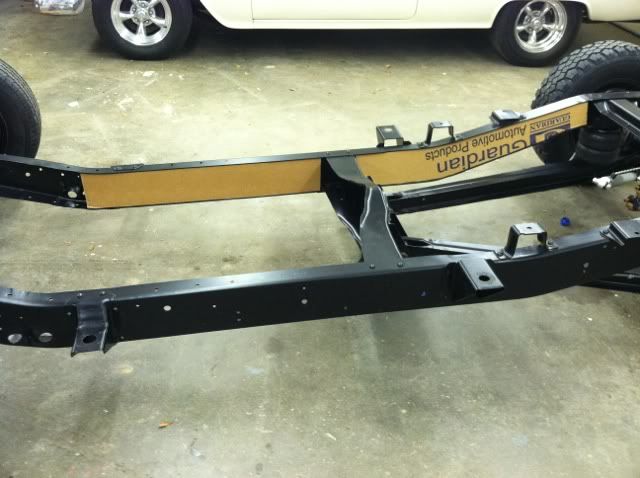 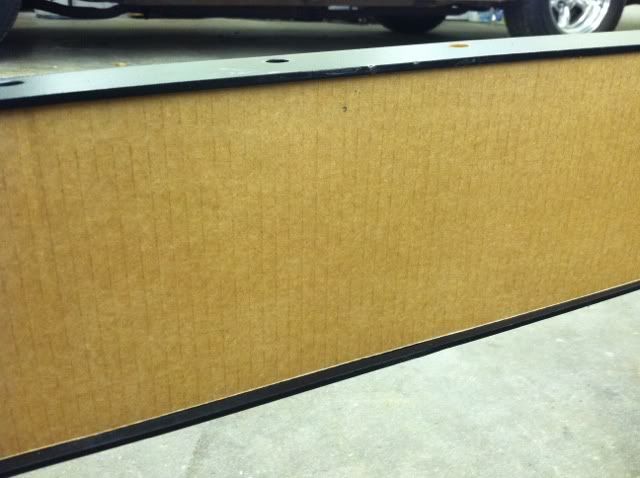
__________________
Project Goldilocks '66 C10 Short Fleet BBW Build '65 C10 Highly Detailed Stock Restoration Thread '78 Camaro Targa Roof Build '55 International Metal/Body/Paint Work '66 F100 Full Rotisserie Restoration '40 Packard 120 Convertible Coupe Restoration How To Restore and Detail an Original Gauge Cluster How To Detail Sand Body Panels, Edges, Corners, Etc |
|
|

|
|
|
#2 |
|
1 thing at a time is progress.
Join Date: Jun 2007
Location: Ball Ground GA
Posts: 5,511
|
Re: X Member Design and Frame Bracing- '66 C10
Tuned in.
 Posted via Mobile Device
__________________
Alan
Philippians 2:14-16 |
|
|

|
|
|
#3 |
|
Registered User
Join Date: Apr 2009
Location: Dawson, Ga
Posts: 513
|
Re: X Member Design and Frame Bracing- '66 C10
Me too!! Since I boxed mine in I might learn sumtin!
|
|
|

|
|
|
#4 |
|
Registered User
Join Date: Jan 2009
Location: Louisville,Ky
Posts: 5,811
|
Re: X Member Design and Frame Bracing- '66 C10
Or you could make something like this http://www.speedwaymotors.com/Deluxe...-Kit,6815.html
|
|
|

|
|
|
#5 |
|
I'm just glad to be here!
Join Date: Jan 2008
Location: Longview, TX
Posts: 4,788
|
Re: X Member Design and Frame Bracing- '66 C10
This sounds like a good idea. I remember something in the past like this. I think it was Porterbuilt that did a tube structure. Not sure.
Can't wait to see what you come up with.
__________________
Karl  1965 Chevy Stepside(Grandpa's Old Blue) and (July 2015 Shop Build!)(2020, the Saga Continues) http://67-72chevytrucks.com/vboard/s...d.php?t=372424 The LST Challenge: http://67-72chevytrucks.com/vboard/s...=1#post7812257 Korbin's 1st Square: "Sunburn" http://67-72chevytrucks.com/vboard/s...d.php?t=418618 1985 GMC Sierra: "White Trash", Korbin's 2nd now... http://67-72chevytrucks.com/vboard/s...d.php?t=632305 Henry - 1984 Chevrolet, Owen's 1st Square |
|
|

|
|
|
#6 |
|
Registered User
Join Date: Jan 2006
Location: Cherry Valley,Ca
Posts: 468
|
Re: X Member Design and Frame Bracing- '66 C10
I'm trying to accomplish the same thing on mine as you are on yours. I made somewhat of a x-member set-up but did it in a simpler way. Heres a link to a thread I started when I installed my rear sway bar but has some pics of the frame.http://67-72chevytrucks.com/vboard/s...d.php?t=350913
|
|
|

|
|
|
#7 | |||
|
Registered User
Join Date: May 2011
Location: Anderson SC
Posts: 3,902
|
Re: X Member Design and Frame Bracing- '66 C10
Quote:
Quote:
Quote:
Keep the ideas coming guys!!
__________________
Project Goldilocks '66 C10 Short Fleet BBW Build '65 C10 Highly Detailed Stock Restoration Thread '78 Camaro Targa Roof Build '55 International Metal/Body/Paint Work '66 F100 Full Rotisserie Restoration '40 Packard 120 Convertible Coupe Restoration How To Restore and Detail an Original Gauge Cluster How To Detail Sand Body Panels, Edges, Corners, Etc |
|||
|
|

|
|
|
#8 |
|
It's Better With Nitro
Join Date: Apr 2008
Location: Chino Hills, CA
Posts: 2,262
|
Re: X Member Design and Frame Bracing- '66 C10
I boxed my frame pretty much the same way you plan to. I thought about doing a tubular X-member, but decided against it after plotting it and realizing that it interfered with too many things I was planning, in particular the 4L80. To stiffen the front a little, I did down tubes from the firewall to the frame and a front motorplate to complement the existing inner fender structure.
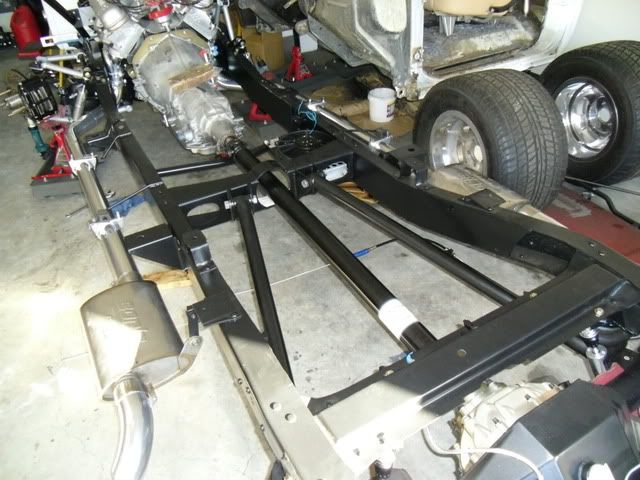 
__________________
1963 C-10: Deluxe-optioned cab, shortbed, fleetside Pontiac 462 ci, Kauffman D-Port alum. heads 4L80E, narrowed sheetmetal Ford 9-inch Tubular front and rear suspension Custom 6-piston front disc and 4-piston rear disc brakes |
|
|

|
|
|
#9 | |
|
Registered User
Join Date: May 2011
Location: Anderson SC
Posts: 3,902
|
Re: X Member Design and Frame Bracing- '66 C10
Quote:
__________________
Project Goldilocks '66 C10 Short Fleet BBW Build '65 C10 Highly Detailed Stock Restoration Thread '78 Camaro Targa Roof Build '55 International Metal/Body/Paint Work '66 F100 Full Rotisserie Restoration '40 Packard 120 Convertible Coupe Restoration How To Restore and Detail an Original Gauge Cluster How To Detail Sand Body Panels, Edges, Corners, Etc |
|
|
|

|
|
|
#10 |
|
It's Better With Nitro
Join Date: Apr 2008
Location: Chino Hills, CA
Posts: 2,262
|
Re: X Member Design and Frame Bracing- '66 C10
Thanks. Here's a shot right after I painted it and rolled it out of my shop. I was planning on doing an X-member something like the photos you posted earlier...but, couldn't fit the structure far enough forward to beneft from the rigidity to stiffen the front of the frame without making it to difficult to service the transmission, in my case. That's what prompted me to go with the down tubes. Keep us posted on your progress!
 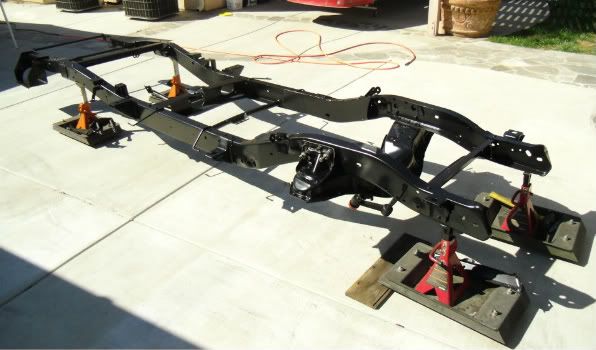 ...down tubes with inner fenders... 
__________________
1963 C-10: Deluxe-optioned cab, shortbed, fleetside Pontiac 462 ci, Kauffman D-Port alum. heads 4L80E, narrowed sheetmetal Ford 9-inch Tubular front and rear suspension Custom 6-piston front disc and 4-piston rear disc brakes |
|
|

|
|
|
#11 |
|
Registered User
Join Date: Sep 2010
Location: Tulsa, Oklahoma
Posts: 1,925
|
Re: X Member Design and Frame Bracing- '66 C10
I see all of the bracing and the addition of a flat piece of steel welded onto the flange of the frame (boxing) in a lot of hot rods. I think it looks great but do not know how much true strength that it adds to the frame of the vehicle.
When trying to make a big truck frame stronger and sometimes longer we keep these simple rules in mind. 1. do not weld on a truck frame .......reinforce and bolt it in. 2. if you cut and weld a frame do it on a angle (45 degrees) so it will not break when loaded (90 degree butt weld).....if we do butt weld, then we line the frame with another frame section, bolt it into place (inner glove) and make sure it goes well past the butt weld. (this spreads the load out away from the butt weld) 3. If you want to add ridigity to the frame make a frame section like the original (out of harder and thicker material if possible)-----do not weld on the frame 4. Only drill a hole in the web of the frame not the top or bottom flange...drilling a hole in the flange weakens the frame and if done the hole must be filled with a very tight fitting bolt or rivet so it helps keep the strength of the flange in tact.... 5. Section modulus X material yield strength = RBM resistance to bend moment. 5a. 6" + 2.5 + 2.5 = 11" X 55000psi yield strength = 605,000 rbm 5b. boxing------------- 11" + 6" box X55,000 + 935,000 rbm (less the strength we took away welding it in.... 5c. double framing 11" + 11" X 55000psi= 1,210,000 rbm So here is what we are doing when we box a frame: a. we make it prettier b. we make it weaker by welding it in and loosing the heat treating of the frame where we weld it. this means if it is loaded heavily it will start to break at that weak point where it lost its strength. If we really want to have a stronger frame adding full U shaped sections of frame material will add strength to the frame, these U sections can be welded together before they are installed and bolted into place. when we add U sections we are getting the benefit of the full length of the frame web and the frame flange.......this adds much more rigidity than boxing the frame and does not weaken the existing frame by removing the heat treating..... Again not trying to start a war just trying to inform.......I do not build pickups for a living but I do build larger trucks (class 8 road trucks) and have been modifying them for 30 years...... Kieth ps I think robnolimit has added some comments and techniques for adding rigidity to our truck frames, he did use tubing to reenforce where the loads get quite high during turning but he did say to use full channel U sections to reinforce the weak points in our truck frames. JMO Kieth |
|
|

|
|
|
#12 |
|
Registered User
Join Date: May 2011
Location: Anderson SC
Posts: 3,902
|
Re: X Member Design and Frame Bracing- '66 C10
Keith, I don't disagree with anything you posted but I wonder how much of it is applicable? You're talking about big trucks made to carry large amounts of weight. Also, were the frames on the old Chevy trucks heat treated, or just stamped from plain steel? The rails sure do drill through easily enough, I can't imagine them being hardened in any way. I'm after bracing the frame to resist torsional twisting, not to handle high towing weight. I would think that different types of bracing are needed for the two different applications? Again, not disagreeing with anything you posted, just wondering how much of that works to resist torsional flexing.
Posted via Mobile Device
__________________
Project Goldilocks '66 C10 Short Fleet BBW Build '65 C10 Highly Detailed Stock Restoration Thread '78 Camaro Targa Roof Build '55 International Metal/Body/Paint Work '66 F100 Full Rotisserie Restoration '40 Packard 120 Convertible Coupe Restoration How To Restore and Detail an Original Gauge Cluster How To Detail Sand Body Panels, Edges, Corners, Etc |
|
|

|
|
|
#13 |
|
It's Better With Nitro
Join Date: Apr 2008
Location: Chino Hills, CA
Posts: 2,262
|
Re: X Member Design and Frame Bracing- '66 C10
I didn't box my frame for vertical load bearing, but to resist some torsional flex/movement. I transferred my plate patterns to a water jet mill and cutting the patterns from 0.1875 1018 steel plate. The plates fit snuggly inside the C-channel frame (which is not heat treated) and I TIG welded them in an inch at a time rotating locations (both front to back and top and bottom). This, in addition to the strength of the OE sheetmetal structures helped to reduce some of the torsional flex in my case without having to go the full roll cage route.
__________________
1963 C-10: Deluxe-optioned cab, shortbed, fleetside Pontiac 462 ci, Kauffman D-Port alum. heads 4L80E, narrowed sheetmetal Ford 9-inch Tubular front and rear suspension Custom 6-piston front disc and 4-piston rear disc brakes |
|
|

|
|
|
#14 |
|
I'm just glad to be here!
Join Date: Jan 2008
Location: Longview, TX
Posts: 4,788
|
Re: X Member Design and Frame Bracing- '66 C10
I agree with Kieth also. His #5 above is what we are trying to improve by boxing the frame. A boxed frame is now a rectangle in cross section as opposed to a C shape for an unboxed frame. A rectagle tube has a better section modulus than the C for a give material. For the welding reducing the yeild strength of the material, that is true, but if you reduce the yeild from 55,000 psi to say 40,000 psi, than your RBM for "new" box is now = 680,000 for example 5b above, still an improvement over the stock number of 605,000.
Now for a frame on a '66 that is not heat treated, the improvement would be a larger precentage. In example 5a 6+2.5+2.5x30,000(mild steel yeild strength) = 330,000. The boxed version (5b) would be = 510,000. That is a 54.5454% improvement in RBM.
__________________
Karl  1965 Chevy Stepside(Grandpa's Old Blue) and (July 2015 Shop Build!)(2020, the Saga Continues) http://67-72chevytrucks.com/vboard/s...d.php?t=372424 The LST Challenge: http://67-72chevytrucks.com/vboard/s...=1#post7812257 Korbin's 1st Square: "Sunburn" http://67-72chevytrucks.com/vboard/s...d.php?t=418618 1985 GMC Sierra: "White Trash", Korbin's 2nd now... http://67-72chevytrucks.com/vboard/s...d.php?t=632305 Henry - 1984 Chevrolet, Owen's 1st Square |
|
|

|
|
|
#15 |
|
Registered User
Join Date: May 2011
Location: Anderson SC
Posts: 3,902
|
Re: X Member Design and Frame Bracing- '66 C10
Like I posted earlier, I agree with Keith, but again, we're talking about two different types of forces acting on the frame. He's talking about vertical loading- heavy weight pushing straight down on the frame, and strengthening a frame to resist downward pressure from high towing weights. I'm trying to reduce the twisting motion of the frame, not keep the frame from bending downward when I've got the bed loaded down.
This pic represents a frame rail under torsional strain. It's twisted down it's length, much like a torsion bar would be under a load. Much different type of load applied to the frame rails than vertical loading.  This is a vertical load bending a frame rail (left side of pic, ignore the right side). It bends downward. I'm not trying to prevent this from happening because I'm not planning on towing a gajillion pounds of weight with the truck.  Now look at this picture, notice that the front crossmember is level. Which of the two pics above does this match? Only one of the rear bags are pumped up. This is a torsional load being applied to the frame, and the frame is absorbing the load instead of resisting it. If it was resisting the load the frame would be straight- the front crossmember would be sitting at the same angle as the rear of the frame, and the front suspension would be absorbing the load instead. 
__________________
Project Goldilocks '66 C10 Short Fleet BBW Build '65 C10 Highly Detailed Stock Restoration Thread '78 Camaro Targa Roof Build '55 International Metal/Body/Paint Work '66 F100 Full Rotisserie Restoration '40 Packard 120 Convertible Coupe Restoration How To Restore and Detail an Original Gauge Cluster How To Detail Sand Body Panels, Edges, Corners, Etc Last edited by theastronaut; 11-29-2011 at 03:25 PM. Reason: added pic |
|
|

|
|
|
#16 | |
|
Registered User
Join Date: Dec 2010
Location: Elbert county, CO
Posts: 249
|
Re: X Member Design and Frame Bracing- '66 C10
Quote:
|
|
|
|

|
|
|
#17 |
|
Registered User
Join Date: May 2011
Location: Anderson SC
Posts: 3,902
|
Re: X Member Design and Frame Bracing- '66 C10
I posted this over in the "Make it handle" thread, but I'll post it here too to keep everyone up to date.
The distance between the upper and lower sections of the frame C channels changes as the frame twist. An upper and lower X member will tie the top and bottom flanges of the C channel together and won't let the distance between them change. If I just made a single layer X member and welded it in the frame rails, it wouldn't hold the frame rails from spreading top-to-bottom. I made this drawing in paint to show how the distance between the frame rails change as they twist. Notice how distance "A" is shorter than distance "B". Just one brace in the center would still allow the frame to pivot around that one brace, no matter how strong the brace is. Upper and lower X members with triangulated vertical bracing in between should lock down the distance of the rails, keeping them from twisting. 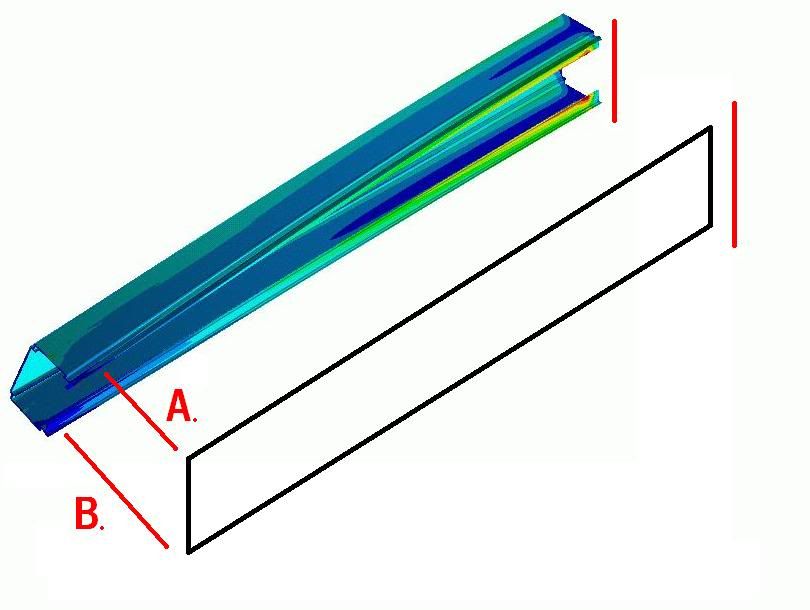 This is sort of what I'm planning on building, just not in such bright colors.  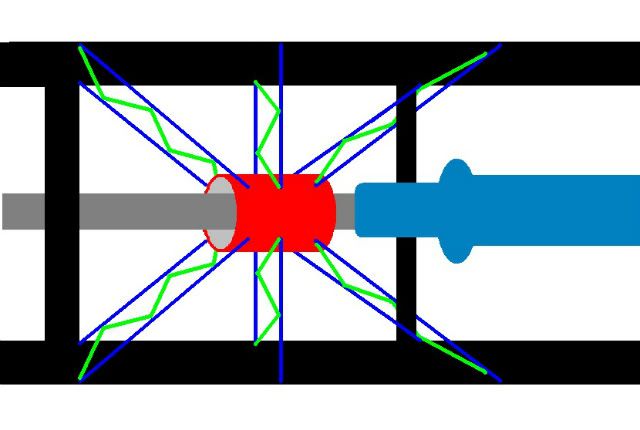
__________________
Project Goldilocks '66 C10 Short Fleet BBW Build '65 C10 Highly Detailed Stock Restoration Thread '78 Camaro Targa Roof Build '55 International Metal/Body/Paint Work '66 F100 Full Rotisserie Restoration '40 Packard 120 Convertible Coupe Restoration How To Restore and Detail an Original Gauge Cluster How To Detail Sand Body Panels, Edges, Corners, Etc |
|
|

|
|
|
#18 | |
|
Registered User
Join Date: Dec 2010
Location: Elbert county, CO
Posts: 249
|
Re: X Member Design and Frame Bracing- '66 C10
Quote:
Are you worried at all that the forces the frame eats during hard driving will be transferred to the rear and forward diagonal joints causing the frame to crack at the joint? That setup will make your frame very rigid and the forces have to go somewhere. I guess that's where over engineering come into play  you engineer it strong enough that you won't be able to creat enough force to break anything you engineer it strong enough that you won't be able to creat enough force to break anythingYour drive train will take it all. Motor mounts and the trans might suffer. Just a reminder, I have no clue what I'm talking about, just Tossing it out there  Posted via Mobile Device |
|
|
|

|
|
|
#19 | |
|
Registered User
Join Date: May 2011
Location: Anderson SC
Posts: 3,902
|
Re: X Member Design and Frame Bracing- '66 C10
Quote:
Instead of the forces being absorbed by the frame (twisting), the frame will be more solid and transfer the forces into the suspension instead. Boxing the frame should spread out the forces being transferred through the frame over a larger area. I would think that the engine/trans/body mounts would be less stressed since the frame won't be twisting as much; the mounts wouldn't see as much movement. I don't know much about any of this myself; I'm completly new to ladder type frames. I've always worked on unibody cars (VW Bugs) so this is all new to me. I got the itch a few weeks ago to brace the frame of my truck while the body was off and I've been trying to figure all of this out since then. I'd like to get it where it handles decent for now, not trying to build something that would even be halfway competitive at an autocross event, but I do want a good base to start with if I ever decide to do more serious suspension upgrades in the future.
__________________
Project Goldilocks '66 C10 Short Fleet BBW Build '65 C10 Highly Detailed Stock Restoration Thread '78 Camaro Targa Roof Build '55 International Metal/Body/Paint Work '66 F100 Full Rotisserie Restoration '40 Packard 120 Convertible Coupe Restoration How To Restore and Detail an Original Gauge Cluster How To Detail Sand Body Panels, Edges, Corners, Etc |
|
|
|

|
|
|
#20 | |
|
It's Better With Nitro
Join Date: Apr 2008
Location: Chino Hills, CA
Posts: 2,262
|
Re: X Member Design and Frame Bracing- '66 C10
Quote:
__________________
1963 C-10: Deluxe-optioned cab, shortbed, fleetside Pontiac 462 ci, Kauffman D-Port alum. heads 4L80E, narrowed sheetmetal Ford 9-inch Tubular front and rear suspension Custom 6-piston front disc and 4-piston rear disc brakes |
|
|
|

|
|
|
#21 |
|
Registered User
Join Date: Sep 2010
Location: Tulsa, Oklahoma
Posts: 1,925
|
Re: X Member Design and Frame Bracing- '66 C10
I understand that we are not hauling a lot of weight per se, but if the frame is more rigid then it will have less flex to begin with, The cross bracing will work better if the outer beams of the frame are stronger, of course the additional x bracing will add rigidity but so will doubling the frame. ps no matter what they say I still do not like welding a frame.
I think our frames are made out of mild steel (55,000 psi yield strength) Newer big truck frames are made from 110,000 psi yield strength material, one could add full U or L channels made of this harder material and bolt it in place and have a really strong frame. Since I want to add full C channels just like the std frame the picture that you show of the twisting of the frame would be different since the flanges help it to resist twist (some work on the way our crossmembers are attached or adding more crossmembers would also help in this torsional rigidity.) The X bracing sure will help also. Want you guys to understand I was not trying to pick a fight just get more information out there and make us all think a little bit before we dive off and do things in a way that mght do more harm than good. i.e. welding to the frame, adding bracing in certain areas can lead to a frame failure right where the reinforcing stops.....due to the weld. We always try to spread out the loads on the frame by adding more material all the way to a area that has more reinforcing above the rear axle or to the center above the axle . by doing this we keep the loads in areas that see the least twist..... If you double frame a truck and stop the reinforcing material right behind the cab of the truck, that is where the frame will fail......if you take it forward to where the frame sees less loading (twist) it will not have that problem... bolting it together is stronger than welding it. If you do weld an area of frame together, then add a diamond patch, it is still better to do a bolted in longer u section to the front and rear of the weld. This is done so the weld does not see loading where the heat treat has been removed. Bolting the frame together spreads the loads out to the web of the frame instead of to the flange. Last edited by kieth; 12-01-2011 at 04:52 PM. |
|
|

|
|
|
#22 |
|
Registered User
Join Date: May 2011
Location: Anderson SC
Posts: 3,902
|
Re: X Member Design and Frame Bracing- '66 C10
Keith, I didn't take it that you were trying to pick a fight, and I appreciate the info you posted. I hope I didn't come across as too defensive of my ideas. I do agree that it would be helpful to double the frame, but I still think the most effective way to limit torsional twisting would be to box the frame and add an X brace. If I can keep the distance between the rails constant, there won't be anyway the rails can twist. I will be fully boxing the frame front to rear, and won't have any gaps like you mention. I don't want a weak area that will crack. I'm even going to cut out the existing crossmembers so I can fully box the frame without missing any areas.
I may be wrong, but I don't think the forces on a frame rail will ever even get close to 55,000 psi, especially if boxing the frame to spread the load out over a larger area. I think that any failure of the frame will result from metal fatigue and cracking. Hopefully, spreading any load out will keep the metal from becoming stressed and cracking. The welding wire I use is ER70S-6 and has a tensile strength of around 79,000 psi, so the weld itself would be stronger than the metal around it. We have done destructive test of our welds and found this to be true; the metal fails before the weld does.
__________________
Project Goldilocks '66 C10 Short Fleet BBW Build '65 C10 Highly Detailed Stock Restoration Thread '78 Camaro Targa Roof Build '55 International Metal/Body/Paint Work '66 F100 Full Rotisserie Restoration '40 Packard 120 Convertible Coupe Restoration How To Restore and Detail an Original Gauge Cluster How To Detail Sand Body Panels, Edges, Corners, Etc |
|
|

|
|
|
#23 |
|
It's Better With Nitro
Join Date: Apr 2008
Location: Chino Hills, CA
Posts: 2,262
|
Re: X Member Design and Frame Bracing- '66 C10
I don't think we took it as a fight, but constructive discussion about different approaches to reinforcing a frame for different applications. It would be nice if the frame rails were a full box instead of C, but short of replacing the entire frame, this was the best way I could strengthen the existing frame. Yes, welding on a heat treated frame is not a good idea, and often the failures in the tubular race car chassises often occur at areas of excessive heat from joint welds, but it is impossible to run a bolt-together tubular chassis for example in drag racing. On the other hand, we now have a rule against heat treating chassises, which combined with front halving and welding on the heat treated chassis a couple of times, contributed to John Force's accident several years ago.
By double frame rail, this is what I was referring to in chassis building. This is my funny car/altered chassis that I built. It is a similar configuration used in high horsepower Pro Mod cars and all funny cars and dragsters. 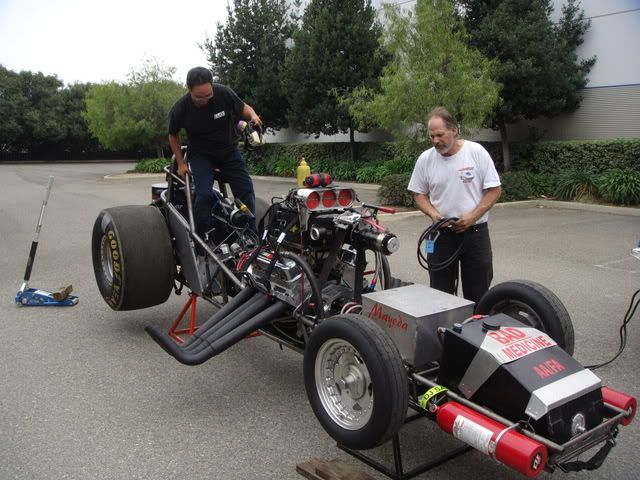
__________________
1963 C-10: Deluxe-optioned cab, shortbed, fleetside Pontiac 462 ci, Kauffman D-Port alum. heads 4L80E, narrowed sheetmetal Ford 9-inch Tubular front and rear suspension Custom 6-piston front disc and 4-piston rear disc brakes |
|
|

|
|
|
#24 |
|
needs more $$$
Join Date: Mar 2004
Location: Sacramento
Posts: 1,936
|
Re: X Member Design and Frame Bracing- '66 C10
Is the goal you are trying to reach just to improve the flex with just crossmembers? I only ask because wouldn't a roll cage stop this type of flex much more?
__________________
1970 2wd Blazer |
|
|

|
|
|
#25 | |
|
Registered User
Join Date: Apr 2001
Location: DALLAS,TX
Posts: 22,091
|
Re: X Member Design and Frame Bracing- '66 C10
Quote:
Roll cages can also be a hazard in a mild crash if they're not properly built & occupants are not properly secured in place.
__________________
67SWB-B.B.RetroRod 64SWB-Recycle 89CCDually-Driver/Tow Truck 99CCSWB Driver All Fleetsides @rattlecankustoms in IG Building a small, high rpm engine with the perfect bore, stroke and rod ratio is very impressive. It's like a highly skilled Morrocan sword fighter with a Damascus Steel Scimitar..... Cubic inches is like Indiana Jones with a cheap pistol. |
|
|
|

|
 |
| Bookmarks |
| Thread Tools | |
| Display Modes | |
|
|